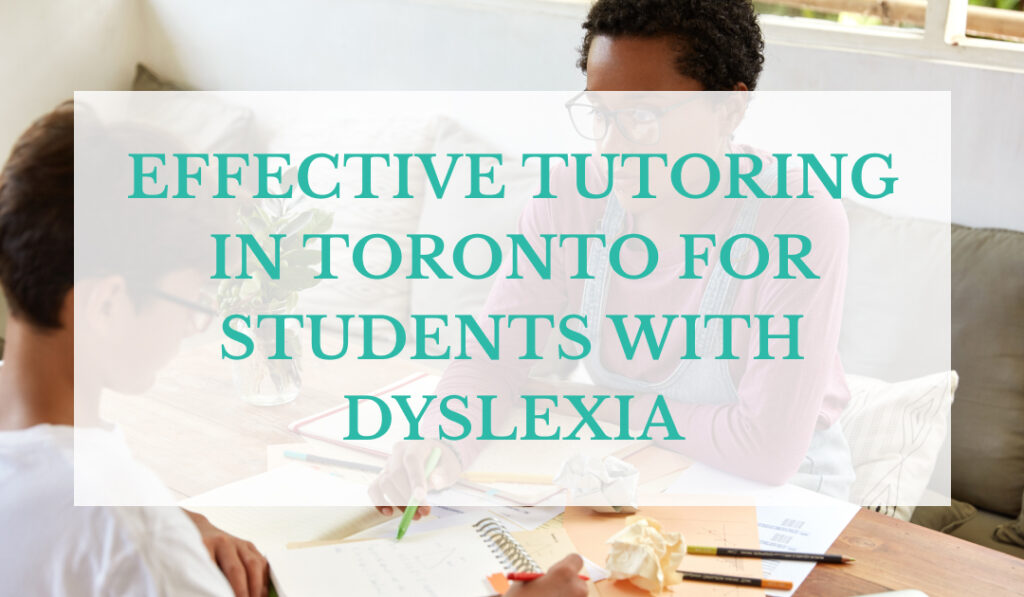Dyslexia is a learning disability that affects a child’s reading, spelling and writing ability. Dyslexic children need extra support and attention on their academics to succeed in school. Tutoring is one of the best methods to offer individualized support to dyslexic students. In this blog, we’ll explore different ways to tutor students with dyslexia.
Is Orton Gillingham’s Approach Effective for Dyslexic Students?
Orton Gillingham is a structured approach used to break reading and spelling into smaller skills that involve letters and sounds. It was the first approach to use direct, explicit, systematic, sequential and multisensory instructions to teach reading, which supports students learning to read, write and spell effectively.
A multisensory approach means students can learn language by listening, speaking, seeing, and writing. This process includes listening to sounds and saying the names of letters while writing them.
How to Tutor Dyslexic Students?
When tutoring dyslexic students, Toronto tutor establishes goals. Dyslexic children may feel overwhelmed. Therefore, it is crucial to create a supportive environment. Experienced tutor takes the time to get to know the child’s strengths, interests, and weaknesses. Setting achievable goals can build the child’s motivation and confidence.
Multisensory Approach
Orton Gillingham is a multisensory approach used for dyslexic students. Orton Gillingham Tutor uses this multisensory approach to engage multiple senses, including sight, sound, touch and movement. For example, a tutor uses visual aids and hands-on activities to teach phonics, reading comprehension and spelling. A multisensory approach can make learning engaging, fun, and memorable.
Phonemic Awareness
Phonemic awareness makes child able to address and manipulate individual sounds in words. Many children with dyslexia struggle with phonemic awareness, which can affect their spelling and reading skills. A tutor can use phonemic awareness activities to support children develop phonemic awareness. For instance, a tutor can ask the child to recognize words’ starting, middle, and ending sounds, mix sounds to form words or divide words into sounds.
Explicit Instruction
Children with dyslexia need concise and clear instructions that divide complex concepts into manageable steps. A tutor uses explicit instruction to teach phonics rules, reading comprehension skills and decoding strategies. For example, Orton Gillingham Tutors use a systematic, sequential and structured approach to teach phonics.
Improving Reading Fluency
Tutors provide reading fluency practices to dyslexic students. Children with dyslexia struggle with reading fluency. A tutor uses timed, repeated and choral reading to support them in learning to read fluently. For instance, a tutor can ask the child to read one paragraph many times, gradually increasing the accuracy and speed. The tutor can also read with the dyslexic children to provide support.
Writing Practice
Children with dyslexia often find it difficult to read, write and spell. They struggle with spelling, sentence structure and grammar. A tutor uses different ways to support students’ writing skills. For example, a tutor can provide a picture prompt to support them in generating ideas. The tutor can also provide feedback on grammar and spelling mistakes.
Benefits of Tutoring for Dyslexic Students
- Students with dyslexia can receive personalized tutoring in Toronto. Each child can receive one-on-one attention. With personalized tutoring, tutors can work closely with students to identify educational needs.
- Personalized tutoring aims to support student’s academic growth and improve their educational experience.
- With Orton Gillingham’s approach, tutors can support dyslexic students in learning to read, write, and spell. Therefore, if you find your child is a struggling reader or they find it difficult to spell and write, you should receive support from a tutor.
Receiving support from experienced tutors at Class in Session for your dyslexic child would be the best option. Tutors will support them in reading, writing and spelling.
